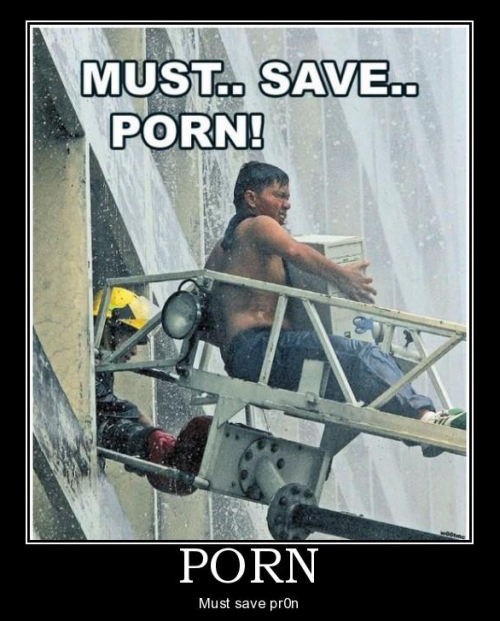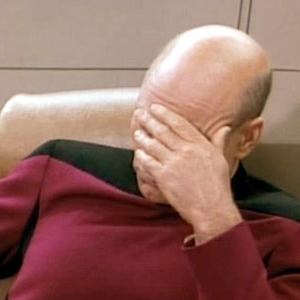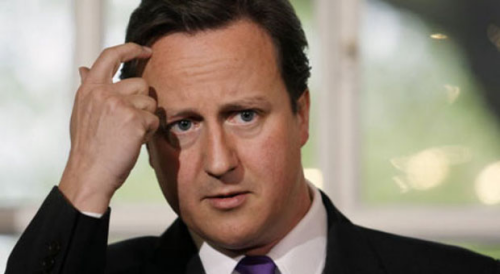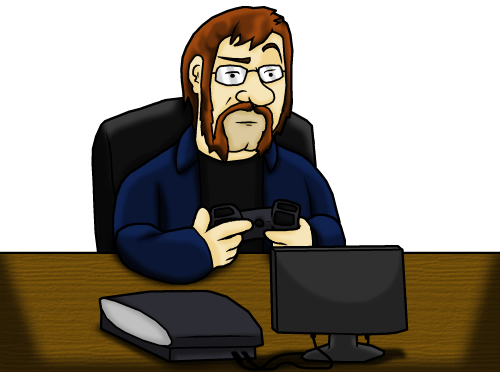They’re Coming to Take Our Pr0n Away! (Ho-Ho, Hee-Hee, Ha-Ha!)
 The following is completely opinion-based, has no factual basis and should be taken at face value for what it is – a biased diatribe against government control of the web.
The following is completely opinion-based, has no factual basis and should be taken at face value for what it is – a biased diatribe against government control of the web.
Oh dear. It’s time for another of those blog posts that’s topical and probably won’t have any relevance in a year or so. I don’t like being topical because topical posts don’t age well at all. For instance, I expect to be posting a retraction to my initial gut reaction to the latest Batman game in about six months. Alternatively, if this goes the way I expect it will, this time next year you won’t even be able to access my website due to “always on” filtering, courtesy of the current conservative government.
Either way, one of the modules I took at university was “digital ethics” – part of that course involved looking at the proposed digital futures framework that was, at the time, being pushed through Parliament. What I got from reading it was that, when it comes to digital content, the UK government doesn’t know its arse from its elbow so when a new issue arises in the news surrounding the government trying to do anything with the internet, I get worried. For what it’s worth, here’s my two cents (or pennies) on the issue – it might at least stir up some discursive debate or, hopefully, make you think on the issue from a slightly different angle.
In case you have no idea what I’m referring to, here’s a quick (utterly factual) recap courtesy of Taiwanese animators:
Firstly, let’s get one thing out of the way: I agree with the principal reasoning behind the prime minister’s intention to enforce the filtering. Child pornography is such a vile, disgusting concept that it just reflects poorly on humanity as a species that such a thing even exists. Child porn = evil, no shit.
The problem I have is that the PM has tar-brushed “porn in general” as being the issue which is terribly…conservative. My other problem is, having heard the PM discuss the issue on Radio 21 the other day, he clearly has no clue how this whole filtering thing is going to work. Let’s discuss some problems that come to mind.
The filtering is going to be terrible
Think back to your days in school (if you’re over thirty, this might not apply to you) – remember the filters that the school’s IT department applied to stop you from finding anything naughty while online? At some point you’d go to Google an innocent search term and the filters would kick in and halt your homework. Good luck trying to find out about Essex for your geography class, because you can’t have the ‘sex’ out of Essex.
Similarly, I remember being able to access a website dedicated to a museum of dildos, no problem (which occurred because someone had discovered that they had a big red one called “Elmo”. I don’t want to know how they found this out). Fellow classmates had no problem trying to get each other into trouble by pulling up XXX sites on someone else’s computer, despite the filters.
I can’t expect the ISP filtering to be any better than your common school internet filtering. They’re not going to do it on a site-by-site basis, that’s impossible – they’re not Google. The PM seems to think that, just because he can access Google via the internet provided by ISP’s, ISP’s must therefore have the same powers as Google. Or, more likely, he’s realised that Google couldn’t give two tugs of a dead dog’s cock about what he wants to filter, so he’s picking on the service providers as they’re easier targets. Sure, you can target the fast food industry because they provide the products that are making everybody fat, or you can pin the blame on your water board if nasty shit starts coming out of your tap2, but this is different – we’re dealing with information here.
It’s going to result in websites being wrongly blocked
I’m almost certain that the dodgy word filtering will result in this website being blocked. I’ve used the exact words “child pornography” in this article, which would be the first exact terms they’d block. I also use the phrase “trophy whore” quite liberally, although I’m referring to an obsession over digital achievements rather than prized prostitutes3. The filters won’t care about that. I equally think that I shouldn’t have to re-word how I express myself just to conform to what is and isn’t allowed – I don’t often feel oppressed about anything (over-fishing, deforestation, etc.), but when you’re limiting how I write that’s actual fascism, no hyperbole (look it up!). I’ll opt to be blocked rather than conform, thankyouverymuch.
I’m intrigued to see how big websites will be affected. Here’s the Wikipedia page on pornography, and it even features a tasteful topless nude. Would the filter block the page, or the site? How about YouTube or DailyMotion? I’d bet a fiver that it wouldn’t take more than five minutes of searching to find some illicit content on those sites. Probably wouldn’t take more than sixty seconds.
The very act of reporting on this issues might, ironically, result in relevant news pages being blocked. After all, you can’t discuss the issue without using certain words, and those certain words are probably what you’d be filtering on! D’oy! *Slaps head*

Let’s look at the other side of terminology filtering – think: what self-respecting filth-monger is going to upload images to websites with names like “childporn.jpg”? Actually, if they did that there probably wouldn’t be a problem!
There’s going to be ways around the filters
I’m just reiterating what practically every news outlet has remarked on – that kids are savvy little bastards and if they really want to get around something, they will. In fact I’m guessing that it’ll be as simple as typing in something like “bypass ISP internet filter” into Google and, hey presto, there’s a step-by-step guide on how to get around them, something that’ll not be filtered out by the ISP filters.
If/when this filtering comes into play, I’m expecting search trends to suddenly have a theme along bypassing filters. It won’t just be kids trying to get around them, you know. I’ll say now that, if the filtering has any of the impact I’ve touched on here in terms of websites I can access, I’ll be ringing up my ISP immediately to get the filters removed. And then I’ll make a formal complaint about being opted in by default. There’s rules and laws in place regarding mail and email as to what counts as “opted in”, and this “default on” business just makes the decision for us without prior consultation.
I can’t get the picture out of my head that David Cameron couldn’t work out how to childproof his computer, so he’s asking the ISPs to do it for him.

Give them an inch, and they’ll take a mile
The issue of child (and regular) pornography aside, let’s look at what the government’s really doing – they’re taking the first steps to censor the web. All they’re doing is bamboozling the general public with specific issues to mask what they’re really doing, which is to start imposing themselves on what information we have access to4. Once they’ve got ISP’s blocking certain terms, there’s nothing to stop them going back and blocking more things. Sure, why not? North Korea and China do the same, and we want to be on par with those liberal go-getters.
I agree that the extremes of the internet need policing – there’s some really nasty shit out there. I don’t think this is the way forward though, it’s just too vague and generic (just like everything the British government does, fnarr fnarr). You don’t ban hospitals because there’s a risk of someone giving birth to the next Hitler5. You don’t ban kids from newsagents because they might look at the top shelf. You shouldn’t ban a whole term because someone might look at something horrible (especially since there’s a whole load of really cool wholesome nerdy things out there to look at instead).
If we’re going to take down the minority (and I have to assume that child pornographers are in the minority because if they’re not then I think there’s a bigger issue with society itself than the internet), the government is going to need to be a lot damn cleverer about how to handle it. They’ve presumably got the resources6? Right now they’re being the teacher who holds back the entire class after school for one kid’s actions, when they should be targeting and dealing with the troublesome party. Oh wait, that would take effort7.
No sex please, we’re British
I was about to go on a carefully crafted, heavily biased diatribe about how this is the sort of issue that comes from rampant computer illiteracy within a country but, blow me sideways, apparently two-thirds of the country own a computer and we’re a world-leader in computer ownership. Yet I cannot feel that the image in my head of Britain being a bunch of computer-suspicious pen and paper users isn’t completely inaccurate (I have no basis for this accusation). I’m baffled about how this has ever came to be a government issue, especially one that the Prime Minister is pushing for. Call me suspicious, but I think Charlie Brooker is on to something when he describes David Cameron’s habits. I can’t help but feel that this campaign is nothing but a cover for different intentions (also I wish he’d stop rooting through my bins). After all, Lancelot wore the colour white to show he was a good knight, but that didn’t stop him from riding in a killing the f*ck out of everybody.
At the end of the day, a wise puppet once said that “the internet is for porn”.
There’s a little bit of Trekkie in all of us. No, not literally.
All the real nastiness aside, perhaps a bit of sex education wouldn’t really hurt anyone. I’ve learnt more about sex from listening to Kevin Smith than I ever did from lessons in school.
What do you think? Will the filtering affect your “me” time? Should I be looking at this from a utilitarian perspective, i.e. “for the greater good”? Leave your thoughts below (you can post using Twitter, Facebook or Google+ profiles!).
P.S. The name of this blog post comes from the song of a similar name by Napoleon XIV. Classic!
- You may laugh, but it’s not my first choice of daytime listening (especially Jeremy Vine, the smug bastard – he just gets on my tits with his over-discussion of non-issues). However, compared to the nine months of being subjected to BBC Radio 1, it’s heaven. I think any prolonged forced listening to the inane preening banter and repetitive playlists of Radio 1 should be covered by the Geneva Convention. ↩
- I’m being colloquial here, using the word ‘shit’ to represent chemicals or the like. If you do have actual faeces coming out of your pipes, that’s probably a localised problem and I suggest you contact a certified plumber. ↩
- Also, the website’s called “Payneful.co.uk”, which I admit could be the name for a family-run S&M site. ↩
- Technically, this has already happened with the Pirate Bay, but that’s a separate issue over content sharing rather than the content they display. ↩
- Anyone notice the thunderstorms we’ve had just before the Royal birth? An ominous portent, perhaps? Ho ho, topical joke! ↩
- Not in this economy! Zing, another topical joke! ↩
- And money, which they don’t have! Ho ho, topical joke the third! Aren’t I a witty bastard. ↩
Post by Sean Patrick Payne+ | July 23, 2013 at 10:36 pm | Opinion Pieces, Technology, Vaguely Topical | 2 comments
Tags: David Cameron is a lizard, incompetent goverments, pr0n, topical issues

